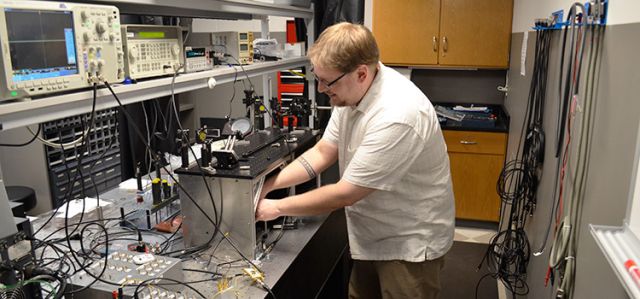Title
Holographic Aperture Ladar
Document Type
Article
Publication Date
2009
Publication Source
Applied Optics
Abstract
Holographic aperture ladar is a variant of synthetic aperture ladar that seeks to increase cross-range scene resolution by synthesizing a large effective aperture through the motion of a smaller receiver and through the subsequent proper phasing and correlation of the detected signals in postprocessing. Unlike in conventional synthetic aperture ladar, however, holographic aperture ladar makes use of a two- dimensional translating sensor array, not simply a translating point detector. Also unlike in conventional synthetic aperture ladar, holographic aperture images will be formed in the two orthogonal cross-range dimensions parallel and perpendicular to the sensor platform’s direction of motion. The central focus is on the development of the stripmap and spotlight holographic aperture transformations. These transformations will allow sequentially collected pupil plane field segments to be coherently stitched together in order to synthesize complex pupil plane fields with larger spatial extent. The challenge in this process is in accounting for the practical fact that both the receiver aperture and the transmitter will be in motion in real-world airborne applications. However, we demonstrate that, owing to the synchronous motion of the transmitter and receiver, resolution enhancements of more than two (stripmap case) or three (spotlight case) times the ratio of the synthetic aperture to the real receiver aperture diameter can be realized. We also demonstrate that in practical applications the holographic aperture ladar image formation process is relatively insensitive to scene depth if a good estimate of nominal scene range is available.
Inclusive pages
1168-1177
ISBN/ISSN
1559-128X
Copyright
Copyright © 2009, Optical Society of America
Publisher
Optical Society of America
Volume
48
Issue
6
Peer Reviewed
yes
eCommons Citation
Duncan, Bradley D. and Dierking, Matthew P., "Holographic Aperture Ladar" (2009). Electro-Optics and Photonics Faculty Publications. 29.
https://ecommons.udayton.edu/eop_fac_pub/29
COinS



